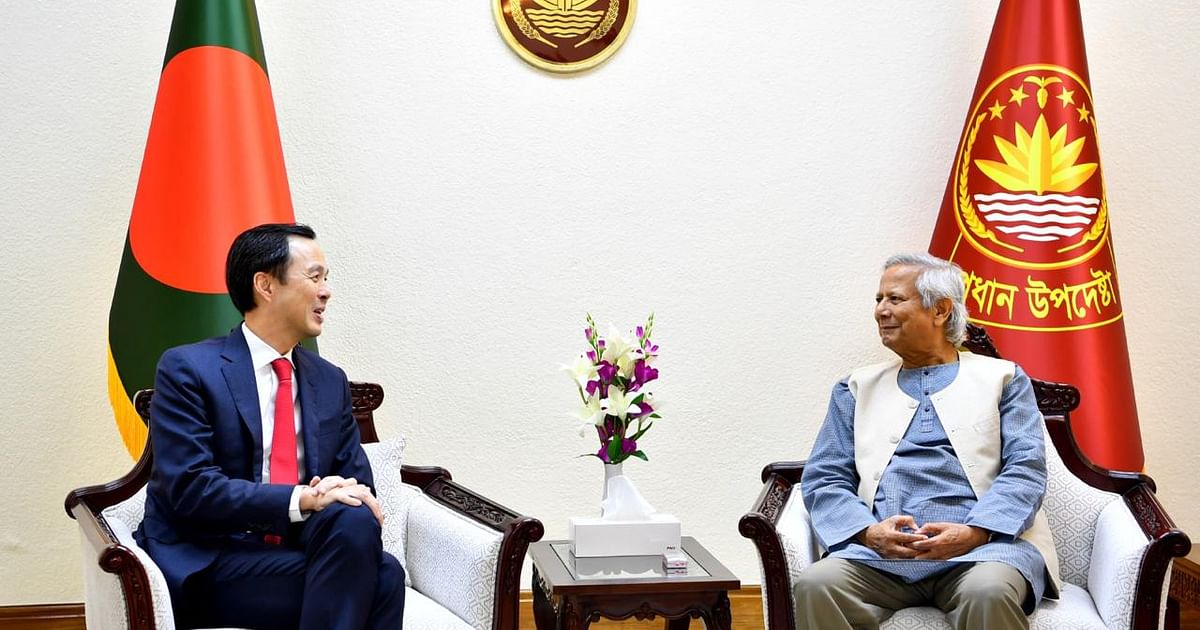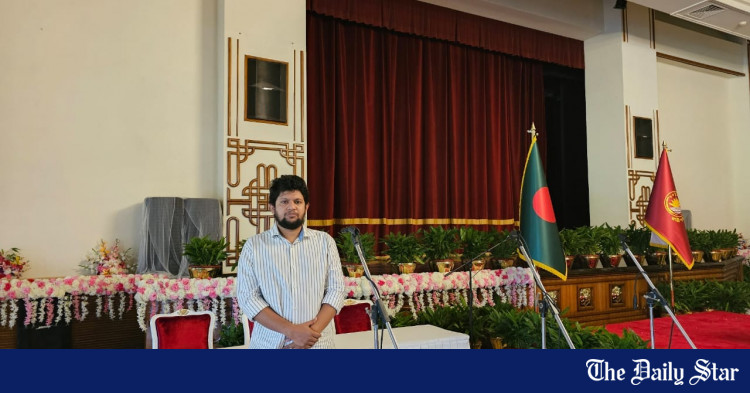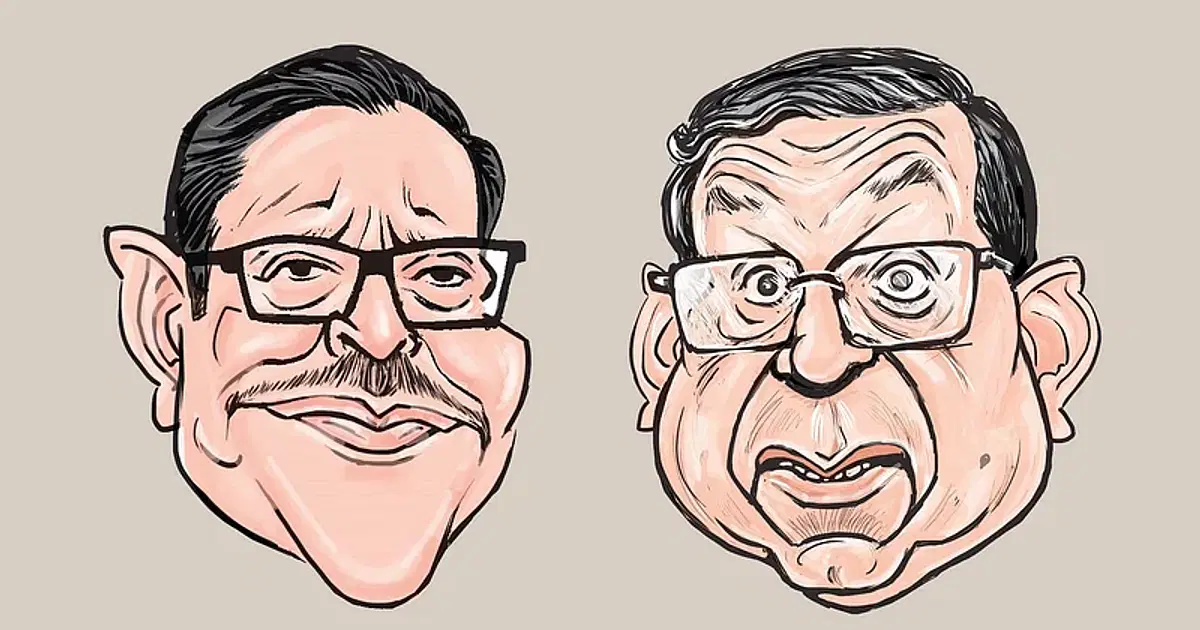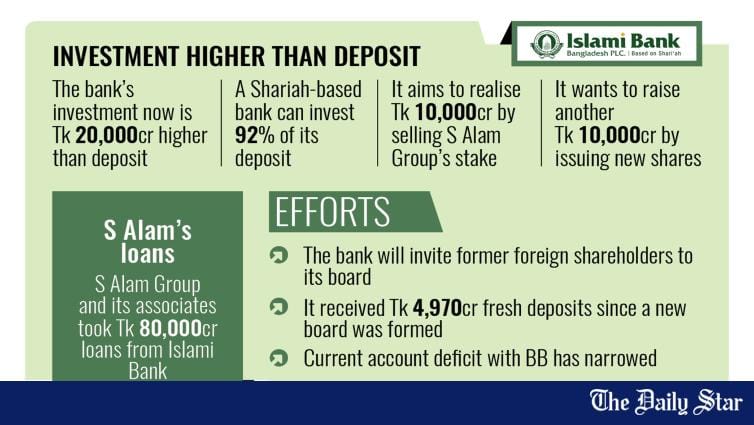Saif
Senior Member
- Joined
- Jan 24, 2024
- Messages
- 17,149
- Likes
- 8,163
- Nation

- Residence

- Axis Group


Chief adviser seeks Singapore's support to bring back laundered money
Chief adviser Dr Muhammad Yunus on Sunday urged Singapore to help recover billions of dollars laundered from Bangladesh when Singapore's ambassador to Bangladesh Derek Loh called on him at his Tejgaon office in Dhaka on 10 November 2024.
Chief adviser seeks Singapore's support to bring back laundered money
Prothom Alo English Desk
Published: 10 Nov 2024, 18: 40

Singapore's ambassador to Bangladesh Derek Loh and chief adviser Dr Muhammad Yunus meet on 10 November 2024. Courtesy
Chief adviser Dr Muhammad Yunus on Sunday urged Singapore to help recover billions of dollars laundered from Bangladesh and help minimise the cost of migration from the country.
The chief adviser made the call when Singapore's ambassador to Bangladesh Derek Loh called on him at his Tejgaon office in Dhaka, stated a press release.
"A lot of money was siphoned off from Bangladesh to a number countries including Singapore," Dr Yunus told ambassador Loh as they spoke for about an hour.
"We need full cooperation from Singapore," he said. Ambassador Loh pledged to cooperate with Dhaka.
Dr Yunus also urged the island nation to work with Dhaka in its goal to significantly cut the cost of recruitment of workers from Bangladesh.
He said the interim government wants to bring down the cost of migration with a view to helping the country's overseas workers remit more money to their families.
"We can create a model structure with Singapore on reducing recruitment costs," he said.
Derek Loh too expressed Singapore's desire to work with Bangladesh, saying they want to remove rent seeking from the recruitment process.
He suggested that Bangladesh digitalise its overseas recruitment system, which will reduce the chances for the workers being exposed to human trafficking and exploitation.
They also discussed trade and investment cooperation, the foreign policy of the Interim Government, shipping, education, and healthcare of their respective peoples.
Dr Yunus said Bangladesh was now ready for business with the economy making a good recovery just three months after the dictatorship left it in shambles. "It is a good time to do business here," Dr Yunus said.
Francis Chong, senior director of Singapore's Ministry of Trade and Industry, said Bangladesh had proposed a Free Trade Agreement with Singapore back in 2021.
A feasibility study has been completed on the proposed FTA, and both nations will now decide the scope of how to launch a free trade deal negotiation, he said.
Loh said Singapore would be happy to share its expertise on water treatment and waste energy management. He proposed collaboration between the food agencies of both countries.
On the Interim Government's foreign policy, Dr Yunus said his government was pursuing good relations with neighbours and trying to revive the SAARC as a platform to engage more extensively with its South Asian neighbours.
He sought Singapore's backing for Bangladesh's inclusion as a sectoral dialogue partner of ASEAN, to which Derek Loh said his country was positive.
Dr Yunus said Dhaka has got huge support from its Western and eastern allies since the Interim Government took over.
"We don't distinguish between east and west. We have to build bridges everywhere," the chief adviser said.
Lutfey Siddiqi, the special envoy to the chief adviser, Lamiya Morshed, senior secretary and principal coordinator of the SDG affairs, and Michael Lee, charge d'affaires of Singapore in Dhaka, were also present during the meeting.
Prothom Alo English Desk
Published: 10 Nov 2024, 18: 40
Singapore's ambassador to Bangladesh Derek Loh and chief adviser Dr Muhammad Yunus meet on 10 November 2024. Courtesy
Chief adviser Dr Muhammad Yunus on Sunday urged Singapore to help recover billions of dollars laundered from Bangladesh and help minimise the cost of migration from the country.
The chief adviser made the call when Singapore's ambassador to Bangladesh Derek Loh called on him at his Tejgaon office in Dhaka, stated a press release.
"A lot of money was siphoned off from Bangladesh to a number countries including Singapore," Dr Yunus told ambassador Loh as they spoke for about an hour.
"We need full cooperation from Singapore," he said. Ambassador Loh pledged to cooperate with Dhaka.
Dr Yunus also urged the island nation to work with Dhaka in its goal to significantly cut the cost of recruitment of workers from Bangladesh.
He said the interim government wants to bring down the cost of migration with a view to helping the country's overseas workers remit more money to their families.
"We can create a model structure with Singapore on reducing recruitment costs," he said.
Derek Loh too expressed Singapore's desire to work with Bangladesh, saying they want to remove rent seeking from the recruitment process.
He suggested that Bangladesh digitalise its overseas recruitment system, which will reduce the chances for the workers being exposed to human trafficking and exploitation.
They also discussed trade and investment cooperation, the foreign policy of the Interim Government, shipping, education, and healthcare of their respective peoples.
Dr Yunus said Bangladesh was now ready for business with the economy making a good recovery just three months after the dictatorship left it in shambles. "It is a good time to do business here," Dr Yunus said.
Francis Chong, senior director of Singapore's Ministry of Trade and Industry, said Bangladesh had proposed a Free Trade Agreement with Singapore back in 2021.
A feasibility study has been completed on the proposed FTA, and both nations will now decide the scope of how to launch a free trade deal negotiation, he said.
Loh said Singapore would be happy to share its expertise on water treatment and waste energy management. He proposed collaboration between the food agencies of both countries.
On the Interim Government's foreign policy, Dr Yunus said his government was pursuing good relations with neighbours and trying to revive the SAARC as a platform to engage more extensively with its South Asian neighbours.
He sought Singapore's backing for Bangladesh's inclusion as a sectoral dialogue partner of ASEAN, to which Derek Loh said his country was positive.
Dr Yunus said Dhaka has got huge support from its Western and eastern allies since the Interim Government took over.
"We don't distinguish between east and west. We have to build bridges everywhere," the chief adviser said.
Lutfey Siddiqi, the special envoy to the chief adviser, Lamiya Morshed, senior secretary and principal coordinator of the SDG affairs, and Michael Lee, charge d'affaires of Singapore in Dhaka, were also present during the meeting.








































